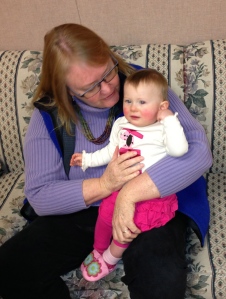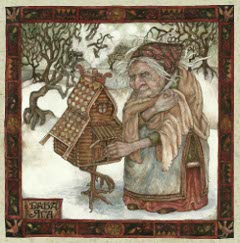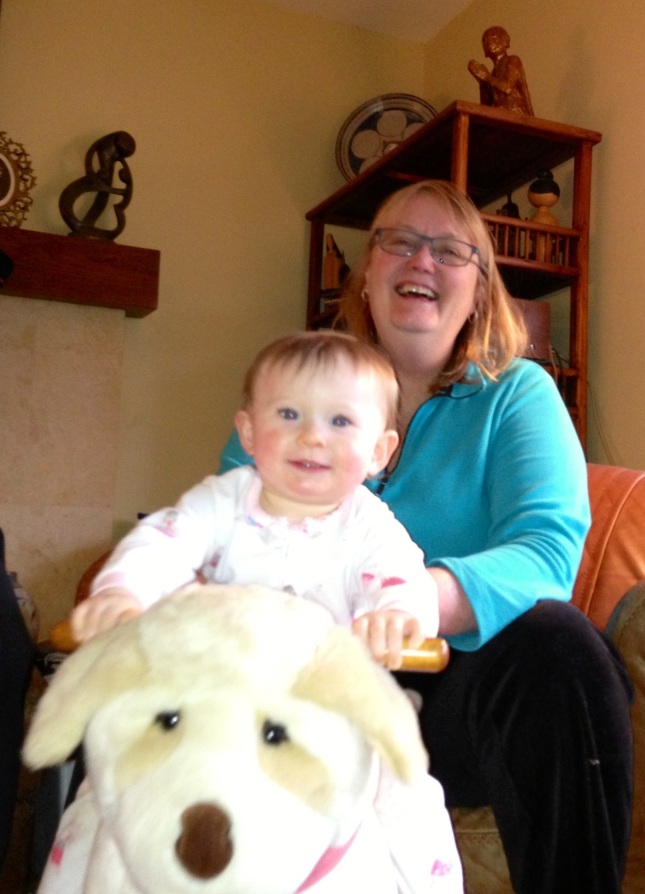A wonderful little girl, just 13 months old, practicing her walking, surrounded by 4 grandparents, parents, foster mother, DHS worker, mother’s lawyer, and all the other waiting and anxious parents in the lobby of the Beaverton DHS office. Alaria is so proud of herself, but is looking around- whom should she walking to- Mom, Dad, gramma…. they are all focused on her at this moment. There have been few times when we have all come together, Alaria’s first birthday, the family court hearing in February… not many other times. Alaria was put into DHS custody on July 3, 2012 at four and 1/2 months old and was placed in my and my husband’s care as “kinship foster parents”. The placement was sudden and simultaneously unexpected and expected, with only a few hours warning for us to prepare for Alaria’s arrival into our home. Alaria’s mom had gotten into a fight with her 16 year old brother the day before, the police had been called, and KE had landed in jail for a night. That was enough for DHS, who had been following Alaria’s situation since well before she was born. As kinship foster parents, we were warned that we had to place the care of Alaria over all the care of our son and Alaria’s mother. We had to act like we were distant objective functionaries of the DHS foster care system, ignoring our relationship with our son.
For six months we cared for Alaria with great love and dedication, never raising our voices around her, responding to her every need. She had been through much upheaval and stress in her first four months, shuttled from home to home, with many different caregivers, her teenage parents rarely caring for her independently, but surrounding her with much drama and hysteria. Over the months with us,we saw Alaria blossom into a happy, centered bright eyed baby, easily adaptable to new situations and people. During those six months both Roman and KE struggled to get their lives together, continuing to smoke weed, miss therapy appts, and not find work or a stable living situation. They did make it to their separate supervised visits with Alaria once or twice a week, forming a tentative relationship with their daughter.
In January Alaria was taken out of our home because we had allowed our homeless son Roman to live in our garage for a week during an icy winter spell until he could find a place to live. Even though he had never caused any harm to his daughter, DHS was concerned we might have arguments with him in Alaria’s presence and didn’t want him in our house with her there. Someone, we don’t know who, filed a report with DHS on January 3 that Roman and his Dad got into a physical fight, which was not true at all, as they were never even in the same room together. A terrible and shocking day when Alaria was taken out and placed in stranger foster care, with no warning, no hearing as to the facts of the case, just her carried away by two social workers, one of whom was a very large imposing figure. There was nothing I could say to stop them. Alaria had no idea what was happening- just BOOM! she was gone. After being in an intimate one child only home with grandparents who had been caring for her part-time and then full-time since birth, she was placed in “stranger” foster care with a large family of bio and foster children 45 minutes away. For the first month, we were only able to see her for an hour or two at a time, not enough to re-establish, let alone build a relationship with her. Very distressing times.

Alaria seeing her gramma for 90 minutes in a DHS office after being suddenly taken away a week before. Not a happy girl.
During the six month check-up court hearing, the judge noted that Roman was not found to be a danger to Alaria, and that DHS needed to have a meeting to expand our visits with her. Another month passed and finally DHS found the time to hold the meeting that would make such a difference in our lives. DHS can move glacially slow at times and radically quickly at other times we were finding out. They follow the recommendations of the court at their own pace.
The hearing went remarkably well in our favor, perhaps because I had followed all DHS’s “rules” to a T and had overcommunicated any issues to them during the three months that she was gone. We had also hired an expensive attorney to let DHS know how serious we were about getting Alaria out of stranger foster care, or at least reducing her time there. Now we were going to visit with her twice a week, on Wednesday and a weekend day for 7 or 8 hours at a time. Roman could visit Alaria at our home and we could have family outings again. Such simple pleasures of family togetherness that had been denied for the last three months- a lifetime for a little girl changing so much every week- from just sitting to crawling and now walking and talking… Can we get to know each other again?










